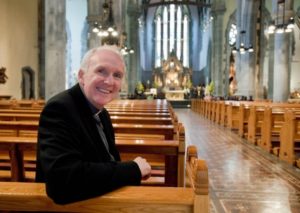
By Sarah Mac Donald - 21 May, 2019

Bishop Brendan Leahy in St John’s Cathedral, Limerick.
Bishop Brendan Leahy has expressed regret that there has been “all too little discussion” about this Friday’s referendum on divorce.
In a statement the Bishop of Limerick said it was important from a Christian faith perspective to vote but he said it would be a shame to just tick a box without first considering the social context and challenges that marriages face today.
“The Referendum is an occasion to acknowledge that we value marriage and reflect further on this. It would be a pity if we simply passed over this opportunity for conversation.”
He also asked that consideration be given to establishing an agency specifically dedicated to the promotion of healthy marriages and support for marriages in trouble.
“Though cohabitation is today much more common than in the past, and though there are today many types of families, the fact is that many people still get married in Ireland. They value marriage.”
However, he acknowledged that marriages break down and he said there was a need to look at why, not least given the family’s role in society.
“Generally, people do not run into a divorce lightly. It is a very painful experience for many.”
Divorce, he said, rarely definitively settles a fractured marriage, especially when there are children. “It certainly needs to be thought through very carefully.”
Elsewhere in his statement Dr Leahy said, “We could ask ourselves at this juncture, are there further systems we can put in place to offer social supports to the majority of adults who are in marriage? Might it not be time to consider establishing, alongside our State agencies for children, for family, for youth, an agency specifically dedicated to marriage, the promotion of healthy marriages and support to marriages in trouble?”
He suggested that it would be good if there was more robust pre-marriage preparation because the “best marriages are the ones where two people approach their union, yes, underpinned by love but also acknowledging the reality; knowing that it is not going to be perfect and glorious 24/7, working together through any darkness.”
Describing marriage as the biggest thing many undertake in their lives, he said marriage preparation was, however, often reduced to a day- or day-and-a-half-long course. “Is that enough by way of preparation for all the challenges that marriage can bring?” he asked.
Separately, Bishop Kevin Doran, in a pastoral message to the people of the Diocese of Elphin, stressed that the Church understands marriage to be a life-long commitment, which contributes very significantly to the stability of society.
The electorate is being asked to vote on the removal of the constitutional requirement for a four-year waiting time between the separation of a married couple and their eligibility for civil divorce.
“I think Catholic voters, like everyone else, must now consider whether the proposed Constitutional change might have the effect of further weakening the social commitment to marriage,” Dr Doran said.
He acknowledged that through human frailty, sometimes combined with difficult personal and economic circumstances, marriages fail.
The original intention of the four-year waiting time was to give couples space to seek a resolution to their difficulties rather than divorcing “at the first sign of trouble”.
“We need to ask if society is living up to its responsibility to prioritise the family and to provide the human supports that might help couples to resolve difficulties that arise in their relationship, before their differences become irreconcilable,” he said.